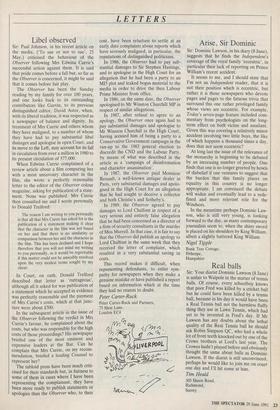LETTERS Libel observed
Sir: Paul Johnson, in his recent article on the media, ('To sue or not to sue', 25 May,) criticised the behaviour of the Observer following Mrs Edwina Currie's successful action against them. It is said that pride comes before a fall but, so far as the Observer is concerned, it might be said that it comes before fair play.
The Observer has been the Sunday reading by my family for over 100 years, and one looks back to its outstanding contributors like Garvin, to its previous distinguished editor, David Astor, when, with its liberal tradition, it was respected as a newspaper of balance and dignity. Its treatment of Mrs Currie and others whom they have maligned, to a number of whom they have had to pay substantial libel damages and apologise in open Court, and its move to the Left, may account for its fall in circulation from over a million in 1980 to its present circulation of 577,000.
When Edwina Currie complained of a review article about a film comparing her with a most unsavoury character in the film, she wrote a perfectly reasonable letter to the editor of the Observer colour magazine, asking for publication of a state- ment. None was published. Mrs Currie then consulted me and I wrote personally to Donald Trelford: The reason I am writing to you personally is that all that Mrs Currie has asked for is the publication of a statement making it clear that the character in the film was not based on her and that there is no similarity or comparison between her and the character in the film. This has been declined and I hope therefore that you will not mind my writing to you personally, as it would be regrettable if this matter could not be amicably resolved upon the very modest terms sought by my client.
In Court, on oath, Donald Trelford described that letter as 'outrageous', although all it asked for was publication of a statement which he accepted in evidence was perfectly reasonable and the payment of Mrs Currie's costs, which at that junc- ture were about £500.
In the subsequent article in the issue of the Observer following the verdict in Mrs Currie's favour, he complained about the costs, but who was responsible for the high costs of those proceedings? His newspaper briefed one of the most eminent and expensive leaders at the Bar. Can he complain that Mrs Currie, on my recom- mendation, briefed a leading Counsel to represent her? The tabloid press have been much criti- cised for their standards but, in fairness to some of them in cases where I have been representing the complainant, they have been more ready to publish statements or apologies than the Observer who, to their cost, have been reluctant to settle at an early date complaints about reports which have seriously maligned, in particular, the reputations of distinguished politicians.
In 1986, the Observer had to pay sub- stantial damages to Sir Stephen Hastings, and to apologise in the High Court for an allegation that he had been a party to an MI5 plot and leaked bogus material to the media in order to drive the then Labour Prime Minister from office.
In 1986, on the same date, the Observer apologised to Mr Winston Churchill MP in respect of similar allegations.
In 1987, after refusal to agree to an apology, the Observer once again had to pay substantial damages and apologise to Mr Winston Churchill in the High Court, having accused him of being a party to a Conservative Government campaign in the run-up to the 1983 general election to discredit the CND and the Labour Party, by means of what was described in the article as a 'campaign of disinformation and character assassination'.
In 1987, the Observer paid Monsieur Renault, a well-known antique dealer in Paris, very substantial damages and apolo- gised in the High Court for an allegation that he had sought to deceive a collector and both Christie's and Sotheby's.
In 1989, the Observer agreed to pay damages to Lord Chalfont in respect of a very serious and entirely false allegation that he had been concerned as a director of a firm of security consultants in the murder of Miss Murrell. In that case, it is fair to say that the Observer did publish an apology to Lord Chalfont in the same week that they received the letter of complaint, which resulted in a very substantial saving in costs.
This record makes it difficult, when representing defendants, to enlist sym- pathy for newspapers when they make a genuine mistake or have published a report based on information which at the time they had no reason to doubt.
Peter Carter-Ruck
Peter Carter-Ruck and Partners, 75 Shoe Lane, London EC4


















































 Previous page
Previous page